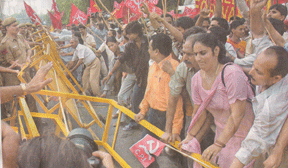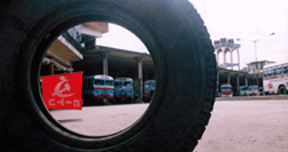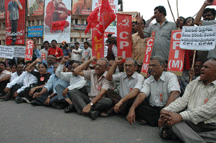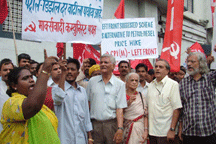 People's Democracy
People's Democracy
(Weekly
Organ of the Communist Party of India (Marxist)
No. 27
July 03, 2005
(Weekly
Organ of the Communist Party of India (Marxist)
|
Vol.
XXIX
No. 27 July 03, 2005 |
SURGING
ANGER AGAINST PETRO HIKE
CPI(M) Spearheads Nationwide Protest

CHAKKA
jam, rasta roko, rail roko, dharnas… all such forms of protest were utilised
by the people through out the country to convey their anger to the government
for its decision hiking the prices of petroleum products. Four Left parties –
CPI(M), CPI, RSP and Forward Bloc – had given the call for a nationwide
protest against this price hike on June 28. There were reports of sizeable
protest actions not only in the Left strongholds of Bengal, Kerala and Tripura
but also from Maharashtra, Andhra Pradesh, Tamilnadu, Bihar, Jharkhand, Punjab
etc.

A
very-well attended rally was held at the call of the Bengal Left Front on a
rainy afternoon at the Rani Rashmoni Road crossing in central Kolkata on June
28. The rally formed a part of the ongoing programme of protests that is echoing
around Bengal against the anti-people decision of the UPA government to increase
the price of petroleum products.
Anil
Biswas, secretary of the Bengal unit of the CPI(M) was the principal speaker at
the rally. Biswas launched a wide-ranging attack on the move by the UPA
government to increase the price of petroleum products, thus causing a further
load of misery to descend on the shoulders of the common man.
Assailing
this latest violation of the spirit and letter of the Common Minimum Programme (CMP),
Anil Biswas said that the Congress-led UPA government in Delhi must never
consider the Left support to be devoid of conditionalities.
The conditionalities, pointed out Anil Biswas, had innately to do with
the safeguarding of the interests of the mass of the people.
Dubbing
the Congress as the force to which the Left had and would stand opposed to, the
CPI(M) leader declared that the Left had no desire to sit unarmed and
defenceless on the coordination committee, the meetings of which it had
correctly chosen not to attend since mere attendance was serving no effective
purpose as far as the people’s interests were concerned.
Anil
Biswas also characterised the ‘breakfasts and luncheons that the Left were
often asked to attend as pointless exercises since the political fall-out of
these tête-à-têtes merely saw the
Congress iterate its position and implement policy decisions, totally ignoring
the Left’s point of view.
Citing
statistics, Anil Biswas showed the validity of the alternative proposals that
the Left had sent to the UPA government to avoid taxing the common man by hiking
the fuel price. The Congress-run UPA government ignored the Left’s advice.
Speaking
on the necessity of launching and continuing with struggles and movements across
the state as part of the all-India protest programme, Anil Biswas said that it
had been through such movements that the Left could be in a position to reverse
some of the most anti-people decisions of the UPA government, including
privatisation of banking sector, reduction of EPF interest, and revision of the
patents act. Only through movements could the Congress-led union government be
made to see things in the correct perspective.
In
building up a massive surge of movements, said the CPI(M) Polit Bureau member,
the Left would welcome the democratic and secular forces within the UPA which
had started to seethe at the manner in which the policy perspective of the
Congress per se was being continuously thrust upon the UPA alliance.
While
the Left would not ever go in for irresponsible moves that would warm the
cockles of the BJP, it would certainly prevail upon Congress to stay away from
the policy outlook of the BJP, something that would ultimately and inevitably
result in the Congress facing the kind of isolation that the BJP now suffers
from.
Other
speakers at the rally, presided over by veteran RSP leader, Debabrata
Bandyopadhyay, were: Prabir Deb (CPI), Prabodh Sinha (DSP), Mihir Byne (RCPI),
Pratim Chatterjee (Marxist Forward Bloc), Moni Pal (WBSP), Sunil Chaudhuri (Biplabi
Banga Congress).
Earlier
on June 27, a sweepingly successful transport strike represented a phase of the
stringent protest of the masses of the people of Bengal against the clearly
anti-people resolve of the UPA union government to hike the price range of
petroleum products. The
CITU-affiliated West Bengal Road Transport Workers’ Federation gave the call
for the transport strike. The Left
TU’s supported the strike call.
The
districts and the metropolis of Kolkata saw the thoroughfares and highways
devoid of all kinds of commercial vehicles, be it buses, trucks, vans, taxis,
auto-rickshaws.
The
strike was preceded by an intense campaign throughout the state. The CITU
leadership addressed rallies and a large number of marches were held throughout
Bengal to make the people aware of the reason why the strike action had been
decided upon.
A
big protest rally was held in the afternoon of June 27 under the aegis of the
Road Transport Workers’ Federation. Among
those who addressed the rally were CITU leaders Shyamal Chakraborty, Mohd Amin,
Subhas Chakraborty, Rajdeo Goala and others.
The
Federation decided to organise a procession in protest of the petro-products
price hike on the evening of June 29 in Kolkata.
The CITU decided that between June 29 and July 5, each factory will
witness protest demonstrations organised.
In
this connection, a novel ‘e-mail jam’ programme has been undertaken by the
CITU where each unit will send hundreds of e-mails to the petroleum ministry of
the union government, effectively jamming the servers.
The
Bengal Left Front has announced several programmes to register the people’s
protests against the price hike of petroleum goods.
A small leaflet will be circulated among the people explaining the how
the price hike could have been avoided.
The
first fifteen days of July will see all Left mass organisations organising
campaign against the price hike in their own areas of activity.
(B
Prasant)
BREAKING
the police cordon at several places, hundreds of activists of the Left parties
in Delhi, joined the nationwide protest called by the Left parties against the
massive hike in the prices of petrol and diesel by the UPA government.
It
was an impressive rally with people from various walks of life who gathered near
ITO and marched through the Bahadurshah Zafar Marg area blocking the road for
over an hour before being water cannoned by the police.
Before
the march began, the protestors were addressed by the leaders of the Left
parties including CPI(M) Polit Bureau member M K Pandhe, CPI(M) MP Dipankar
Mukherjee, CPI secretariat member D Raja, Forward Bloc leader G Devarajan, RSP
leader Asit Ganguli and CPI(M)
central committee member Jogendra Sharma. CPI(M) Polit Bureau member Brinda
Karat was among those who led the protest.
The
speakers sounded a warning to the UPA government to halt its anti-people
measures and not to take the Left support for granted.
This
price hike, they said, came in the wake of three price hikes in petroleum
products effected in the past one year and imposed an added burden on the
people. It will affect the farmers
and increase the cost of living for those who rely on transportation for
pursuing their daily work and activities. The price increase in diesel in
particular will be inflationary and have a cascading effect on prices of all
commodities, they felt.
The
protesters did not agree with the justification provided by the government. The
raise had already been affected during budget to the tune of 1.70 on petrol and
Rs 1.15 on diesel per litre. Even the road cess was also increased by 50 paise
at that time.
Raising
slogans and expressing their anger, the protesters demanded immediate roll back
of the prices and implementation of the alternative proposals given by the Left
parties. They also called upon the UPA government to sincerely implement the
Common Minimum Programme.
The
protest echoed with a united call for:
Cancelling
of the additional cess of 50 paise per litre for highways
Change
in excise duty so that it does not lead to retail price hike
Doing
away with import parity in product price
Formation
of price stablisation fund to meet the fluctuation of global crude price
with the cess collected on indigenous crude amounting to Rs 5400 crore per
annum, and
Review
of duty drawback payment to exporters of petroleum products by private
refineries.
Militant
protests were also reported from adjoining areas of Delhi like Ghaziabad,
Saharanpur Chowk in Loni and GT Road in Modi Nagar. In Noida, several hundred
CPI(M) workers blocked the traffic at Gol Chakkar Chowk. The protesters called
upon the government to reverse its decision and take measures which can absorb
the burden of the increased international oil prices.
Along
with other states of the country, Tripura also registered a roaring protest on
June 28 against the recent hike in the prices of petrol and diesel. At the call
of the CPI(M), innumerable protest rallies, processions, dharnas
– small and big – were held all over the state. At the same time the
TMSU, an affiliate organisation of All India Road Transport Workers Federation
including the Auto Rickshaw Workers Union, TRTC Workers Union etc. called for a
transport strike on the same day. With the spontaneous protest of the common
people and all the vehicular traffic gone off the street, normal life in the
state came to an absolute standstill.
The
central protest rally was held at Sadar Divisional on Sakuntala Road in Agartala.
It was addressed, among others, by CPI(M) state secretary Baidyanath Majumder
and CPI(M) state secretariat member Manik Dey. They explained the perspective of
the formation of the UPA government and how the Left was providing outside
support on the main condition that the pro-people commitments made in the CMP be
implemented. Baidyanath Majumder said anybody would be surprised to know that
out of the Rs 2.50 hike effected in the price of petrol, Rs 2.20 is the excise
duty, and in diesel it is Rs 1.16 of the Rs 2.00 hike. He said this exposed the
fact that the hike had no link with the increase in the price of crude oil in
the international market. Left parties made specific viable alternative
proposals to avoid burdening the common people by such a price hike, which the
government ignored.
Referring
to the disinvestment in BHEL, Majumder reiterated that the CPI(M) would
vehemently oppose any move to weaken the navaratnas.
Criticising the UPA government for acting in contravention of the CMP, as was
seen its approach towards the strategic sectors like bank, telecom, insurance,
defense etc, the CPI(M) leaders it must not take the Left support for granted.
“We will always side with the innumerable toiling masses, not the affluent
few.” The rally was presided over by senior Party leader, Chitta Chanda.

ON
the call given by the Left parties, protesting against the recent hike in prices
of petrol and diesel and demanding its withdrawal, the CPI(M) conducted rasta
rokos all over the state on June 28. As
per the latest information available, rasta rokos were held in all the district
headquarters, 120 municipal towns and hundreds of Mandal centres. Rail roko was conducted at Visakhapatnam, Nellore, Cuddapah
and Anantapur.
In
the state capital Hyderabad, in the rasta roko held at a major centre of RTC X
Roads, CPI(M) Polit Bureau member B V Raghavulu, central committee member
Koratala Satyanarayana and state
secretariat member Y Venkateswara Rao, assistant secretary of the CPI state
council K Narayana and state secretariat member Aziz Pasha participated.
Addressing
the people who participated in the rasta roko, Raghavulu criticised the UPA
government for acting against the common minimum programme and warned that the
CPI(M) was prepared to fight for redressal of the problems of the people.
He explained that there was no justification in hiking the prices of
petroleum products in the country based on the international prices of a select
basket of fuels and that the present hike was unwarranted.
The burden of tax of 50 per cent on petrol and 35 per cent on diesel imposed by
the government of India was unbearable. Handing over blocks of natural gas and
petroleum products to big corporate companies, the government was working under
their tutelage, criticised Raghavulu. Coinciding with the price hike, the state
government also increased sales tax on these products, imposing additional
burden of Rs 50 crore on the people of the state, he criticised.
Narayana also addressed the gathering.
On
the day when the price hike was announced by the government of India and the
next day also, the CPI(M) conducted state wide demonstrations on a large scale,
protesting against the hike. P Madhu, Rajya Sabha member of the Party,
participated in the protest demonstration held in Hyderabad. There was good
response from different sections of the people all over the state to these
widespread protests.
On
June ëy, the state committee of the CPI(M) organised a seminar on “Hike in
Prices of Petrol and Diesel - Alternative Ways”
at Sundarayya Vignana Kendram. Deputy
leader of the CPI(M) in the Rajya Sabha Dipankar Mukherjee, B V Raghavulu and P
Madhu participated in the seminar. The
seminar evoked keen interest in different sections of the people and the media
as well.
MAHARASHTRA

BRAVING
torrential rains all over the state, thousands of people led by the CPI(M) and
CPI took part in large demonstrations and road blockades at over 75 centres in
29 districts of Maharashtra on June 28, in accordance with the nationwide Left
parties call to protest against the massive hike in petrol and diesel prices
effected by the UPA-led central government. Mass actions took place in every
single district where the CPI(M) has a presence. In some districts, leaders and
activists of other Left and secular parties like the PWP, JD(S), SP, FB and Lal
Nishan Party also joined these Left demonstrations. All these actions received
excellent coverage in both print and electronic media throughout Maharashtra.
These
statewide demonstrations, while condemning the steep hike in petroleum products,
also propagated the alternative that had been repeatedly placed by the Left
before the UPA regime to avoid such a price hike. They also specifically
denounced the central government’s proposal to disinvest in navaratnas
like BHEL, in flagrant violation of the Common Minimum Programme (CMP). The
Left demonstrations criticised the pro-liberalisation and anti-people thrust of
the economic policies of the UPA regime in several spheres and called for
stringent implementation of the CMP. At the same time, these demonstrations also
ridiculed the BJP, which during its stint in power, had not only hiked the price
of petroleum products several times, but had also implemented the same
retrograde economic policies directed against the people, leading to its sound
defeat at the hustings last year. The June 28 demonstrations called upon the UPA
regime to heed the warning of this experience.
In
the state capital Mumbai, a militant demonstration was held for over two hours
outside the Churchgate railway terminus in the heart of the business centre. The
demonstration was led on behalf of the CPI(M) by its veteran leader Ahilya
Rangnekar, state secretary Ashok Dhawale, state secretariat members Mahendra
Singh, K L Bajaj, Krishna Khopkar, state committee members Sayeed Ahmed, Kishore
Theckedath, Vivek Monteiro, Hemkant Samant, district secretariat members Ashok
Banerjee, S K Rege, Sonya Gill, and on behalf of the CPI by its state council
members Prakash Reddy and Sukumar Damle.
In
Solapur city, over 1000 people conducted rasta roko actions at six centres in
the city, nearly 900 of whom were arrested under the leadership of CPI(M) state
secretariat member and MLA Narsayya Adam, state committee members Ravindra
Mokashi, Allabaksh Patel and CPI leader R G Mhetras. In Kolhapur district, over
1000 people conducted rasta roko actions in six tehsil centres and they were led
by CPI(M) state committee members Suryaji Salunkhe, Chandrakant Yadav and CPI
national council member Govind Pansare.
Rasta
roko actions and demonstrations were also conducted at several centres in the
following districts: Nagpur, Wardha, Chandrapur, Gondia, Bhandara, Yavatmal,
Amravati, Buldana in the Vidarbha region; Nanded, Hingoli, Parbhani, Beed, Jalna,
Aurangabad, Latur and Usmanabad in the Marathwada region; Nashik, Nandurbar,
Dhule and Jalgaon districts in the North Maharashtra region; Ahmednagar, Pune,
Satara, Sangli (and the above mentioned Solapur and Kolhapur districts) in the
Western Maharashtra region; and Thane and Raigad districts in the Konkan region.
In all the above actions the CPI(M) participated in strength and almost all
state secretariat and state committee members of the Party, along with the
district leadership, took active part in the campaign and in the June 28
actions. Detailed reports from many of these centres are still coming in at the
time of sending this report.
(More
reports from states will be carried in the next issue – Ed)